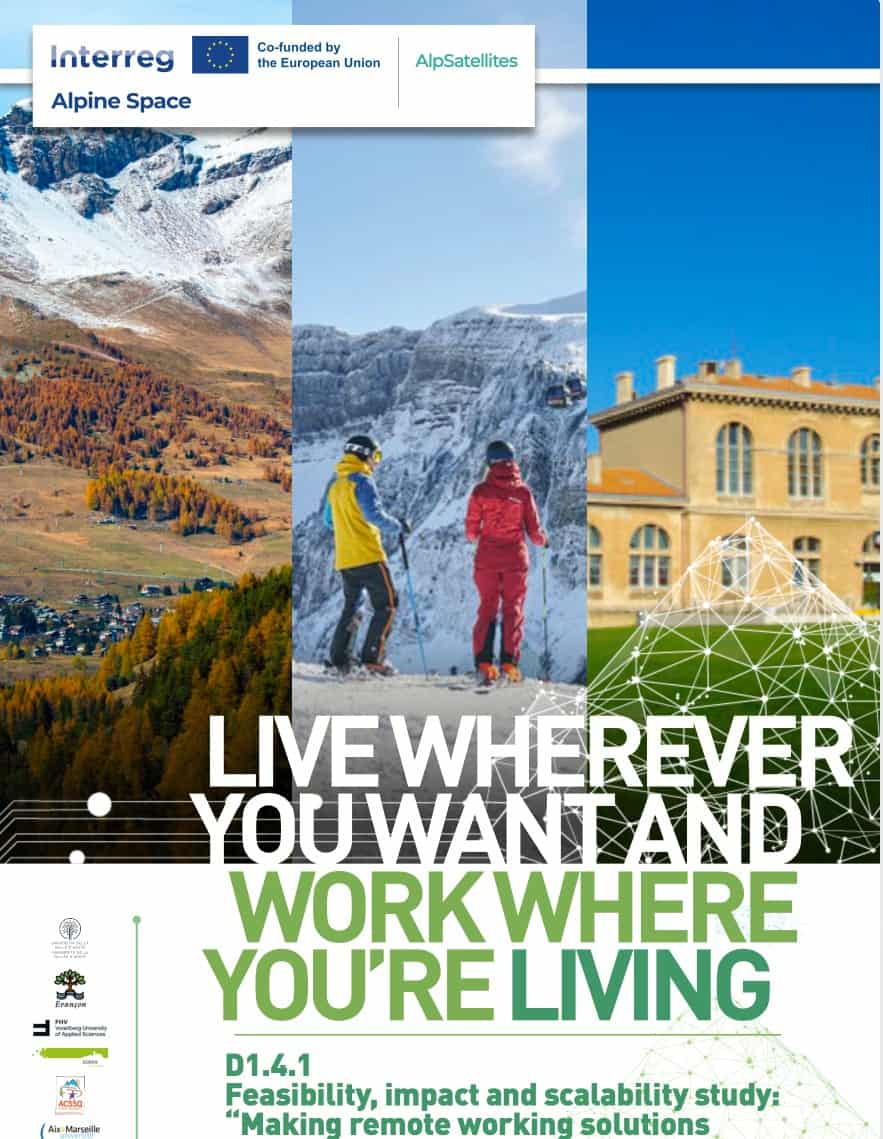In response to the ever-evolving landscape of remote work and coworking spaces, partners from France, Italy, and Austria have undertaken the AlpSatellites project, initiated in November 2022 and now nearing its conclusion. These efforts aimed to explore innovative solutions that effectively address the challenges and leverage the opportunities brought about by the changing paradigm in this field. From a methodological perspective, significant attention was paid to creating solutions tailored to the unique needs of each territory. Subsequently, the project’s final phase involved a comprehensive analysis of the solutions developed by all partners. The partners share some common characteristics and challenges, but they also exhibit clear regional differences. Consequently, the maturity level of each country’s solutions varies, reflecting the nuanced considerations involved in addressing the diverse landscapes and demands of remote work and coworking spaces. Each partner has placed greater emphasis on different aspects of their proposed solutions, whether it be financial feasibility, technical feasibility, scalability, potential social impact, economic sustainability, environmental considerations, or transferability to other regions. France The French partners focused on creating a shared digital platform dedicated to remote workers in a new territorial area. This platform aims to provide a wide range of practical information and enhance the remote worker experience. The financing strategy for initiatives of this kind was carefully designed, involving local authorities, subsidies, and potential European funding. The validity of this financial strategy was validated by a team coordinated by PETR (Pôle d’Équilibre Territorial et Rural) in collaboration with the municipalities involved. Italy Italy conducted an economic feasibility study to assess the creation of coworking spaces in the Alps. This evaluation examined the projected operational costs and potential revenues from these spaces. The goal was to fully understand whether these spaces could be economically sustainable in various geographical areas. The methodological approach considered variable costs, excluding fixed costs related to infrastructure, which can vary significantly from one area to another. The result was a detailed assessment of the economic feasibility of coworking spaces in the different sub-areas of the Alps. Austria Austria developed a solution designed to be easily transferable to other regions. They created a comprehensive framework and guidelines for implementing similar projects, employing a classical project management approach. This solution was approached as a project, with a particular focus on clear goals, feasibility/resource lists, cost-benefit analysis, and risk assessment. Austria emphasized not only financial aspects but also the social, cultural, and economic dimensions of coworking initiatives. Their methodology can serve as a comprehensive guide for implementing similar projects in different regions. In general, each partner tailored their solution to specific needs and regional characteristics. The common thread among all these initiatives was a focus on effective management, cost-saving strategies, and consideration of local needs to enhance the feasibility of coworking projects. Public-private partnerships were suggested as an important means to support the economic sustainability of coworking spaces, highlighting their potential impact on various aspects, including economic diversification, environmental sustainability, and social cohesion in the regions involved. The insights gained from this research can serve as guides for future projects, aiming to promote sustainable development, economic growth, and the well-being of the communities involved.
For more insights, check out the deliverable https://www.alpine-space.eu/wp-content/uploads/2024/02/Alpsatellites_Deliverable_1.4.1-24.pdf



